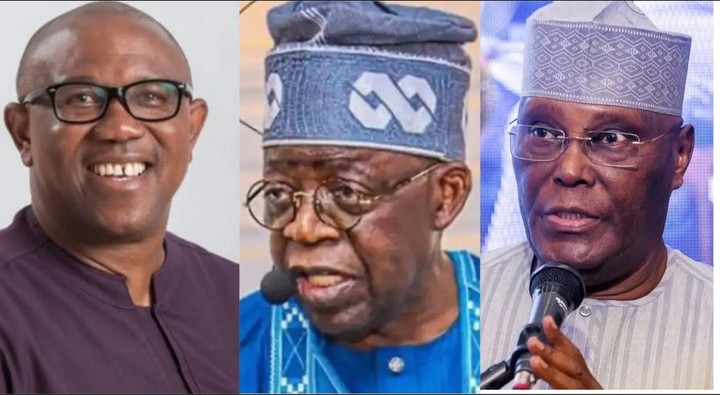Hot Stories
Recent Stories
2023: Obi's Popularity Among Youths Worries Atiku, Tinubu’s Camps
Posted by Thandiubani on Mon 08th Aug, 2022 - tori.ngSince Peter Obi crossed over to Labour Party, he has been getting massive support especially from youths.

It has been revealed that the camps of Atiku Abubakar, presidential candidate of the Peoples Democratic Party (PDP), and that of Asiwaju Bola Ahmed Tinubu, the presidential flagbearer of the All Progressives Congress (APC) are worried over the popularity of Labour Party presidential candidate, Peter Obi.
According to Daily Independent, the reason is because of the massive support Obi is getting from youths.
A recent statistics revealed by the Independent National Electoral Commission (INEC) disclosed that about 71% percent of the 12.2 million newly registered voters are youths.
According to the statistics released by the electoral umpire, about 8.7 million are between the ages of 18 and 34 while about 2.4 million are between the ages 35 and 49.
Those between ages 50 and 69 are about 856, 017 while about 127, 541 are over 70.
Since the return of democracy in 1999, the presidential election has always been a twohorse race between the APC and PDP .
However, it appears it will be a different scenario in the 2023 presidential election with the entrance of Peter Obi who is the presidential candidate of the Labour Party.
Obi, a former governor of Anambra State, had already purchased the PDP presidential form but withdrew from the race few days to the primary to join the Labour Party.
Since then, support for him has grown tremendously with many youths pledging to work for his victory in next year’s presidential election.
Daily Independent gathered that the three parties in their bid to win the 2023 presidential election are currently working assiduously to curry the support of youths and also engage in youth-centric campaigns when INEC lifts the ban on political campaigns by September ending.
[b]A credible source in the Labour Party said former President Olusegun Obasanjo who in recent times has raised the alarm over myriads of unresolved problems under the APC-led administration is working round the clock to amass support for the party and Obi in the 2023 elections.
Speaking with Daily Independent, Festus Asiriuwa, a chieftain of the PDP, said while many youths have shown interest in the 2023 presidential election, it cannot be said that all of them joined because of Obi or will vote for Labour Party in the election.
“Yes, I saw the INEC statistics about 71 percent of newly registered voters being youths but the truth is that are all these youths supporters of Obi? While it is true that Obi has resurrected Labour Party from the dead and he will divide the votes in 2023, it is wrong to say all the youths who recently registered are for him.
“Do you know the number of youths also clamouring for Atiku and Tinubu? So, let’s just wait and see but I can tell you, this will be the most interesting election we have ever seen”.
Bashiru Apapa, Deputy National Chairman of the Labour Party, said the party will win the 2023 presidential election given Obi’s growing popularity, especially among the youths. Speaking during a sensitisation for Labour Party members in Ekiti State, Apapa said, “There are some people who you may not believe are coming up to support Obi; some leaders up to heads of state are in support of Obi.
Many governors, more than five of them, are supporting the party underneath. We don’t want to mention their names for now.
“It is because of the way Obi performed before. Again, not all of them believe that Nigeria should continue the way it is going now.
They want change, better and positive change for that matter, not like the other change we experienced in the past.”
On its part, the South-West Agenda for Asiwaju 2023 (SWAGA’ 23) on Sunday said despite the rise of the Labour Party, the 2023 presidential election is a two-horse race between Atiku and Tinubu.
Otunba Bosun Oladele, National Secretary of SWAGA, said most supporters of Peter Obi, the Labour Party presidential candidate, are only making noise on social media and making movements without motion.
According to him, the recently concluded Osun governorship election and the primaries held across the country few weeks ago have proven that social media noise does not translate to votes during elections.
Top Stories
Popular Stories
Stories from this Category
Recent Stories





















































